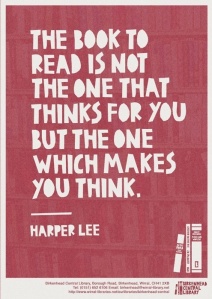While I was home for Thanksgiving my dad and I had a few discussions about journalists and journalism. My house has always been a place where heated discussion is not considered disrespectful, so although my dad and I disagreed on a lot of points (namely, the role of journalists, whether or not they should (or can be) be objective and whether or not the media has a liberal bias), it wasn’t a full-blown argument.
My dad is a very intelligent man, and although we disagree, he typically has informed opinions. (I can’t say always, Dad. That would be admitting defeat!) Even though he believes that the “biased liberal media is in the pockets of the government,” he’s not your typical ill-informed crazy who purports ignorance. This blog post is not in any way meant to disrespect my father, as he is one of the people I respect the most in life (I even let him read this post before I published it so he knew what was coming). However, I could not let one thing he said go unaddressed.
While making a point about how the “biased liberal media is in the pockets of the government,” he brought up the story about Crystal Mangum. Mangum falsely accused three Duke University lacrosse players of rape. According to my dad, the media jumped all over the rape accusation because the three men are white and Mangum is black. Also according to my dad, the story got much less media attention after the allegations were proven false, and even less media attention now that Mangum was found guilty of murdering her boyfriend. (Here is where he got this evidence.)
“No one reported on the fact that she was convicted of murder,” my dad said. And yet, he had heard of the story. He read that she was convicted because a journalist wrote a story about her conviction. Otherwise, he might not have known about it. (Dad, just to prove that people did report on it, here’s a story from The Huffington Post, and one from USA Today by the AP. The AP brief also ran in the New York Times, and here is a story by CNN.)
I told my dad that, obviously, someone did report on the story, because he read about it. His point, however, was that the current story (and the revelation that the accusation was false) didn’t receive the national media attention that the rape accusation had received.
All of this is just background, though. What I really want to talk about happened next.
“Dad, obviously someone reported on the story, because you’re telling me about it right now.”
“Yeah, but it doesn’t matter because it didn’t receive national attention.”
I took that to mean that since the story he read didn’t receive national attention, and since the journalist who wrote it doesn’t work for a publication that would have a large national audience, the story he/she wrote doesn’t matter. I also took it to mean that it didn’t matter that this journalist did his/her job since the story wasn’t far-reaching. (That could have just been my emotional response, though. I was very shocked and indignant when my dad said this.)
My dad is only right in that publications like the New York Times have a larger audience than a local publication. Whether or not stories at small publications “matter,” though, that’s where my dad is wrong (sorry, Daddy).
I’m not sure where my dad read the story about Mangum, but the journalist who wrote that story probably works long hours, has tight deadlines and has faced furlough days. All for not very much pay. Nor for much recognition, by my dad’s standards, as he/she doesn’t work for a national newspaper.
And yet that journalist continued to do his/her job.
Journalists at the New York Times work hard and produce excellent work. But so do the journalists I worked with this summer at Macon, Ga.’s local paper. They matter, and the stories they tell matter, because they serve their community (Take for example, this recent story on corrupt cops, or the Macon in the Mirror collaboration with Georgia Public Broadcasting and my university).
Local journalists work diligently every day to report on the day-to-day goings on in small cities and towns. And let me tell you, county commission meetings are long and not nearly as interesting as breaking a story about NSA surveillance. But local journalists keep going to county commissioner meetings because it’s their job. And even though they might complain about their job, they really love it (I think).
Doing something that you love, or doing something important, for minimal reward is what matters. Caring about a small town or city enough to dedicate yourself to telling its stories is what matters. Caring about a small town enough to want to improve that town is what matters.
What I think lies at the heart of the issue is a local vs. national way of thinking. Don’t get me wrong, national issues/stories matter a lot. But Macon is where I live. I’ve only lived here for two-and-a-half years, but it’s my home. And before I want to focus on the nation, I want to focus on my home. My home has important and interesting stories to tell, and telling those stories matters.
So, did the Mangum story receive a lot of media attention (some would say sensationalism)? No. Should it have? Perhaps. Journalists are people too, and sometimes we don’t do our jobs as well as we should. However, does that mean that the Mangum stories that did run, and the journalists who wrote those stories, are unimportant? Absolutely not.
Maybe I’m just an overly-idealistic j-school student, but there has to be some reason that we do our job, right? And that reason certainly isn’t pay or recognition.
Bien faire et laisser dire,
Emily









